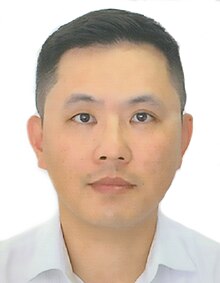Chen I-hsin
You can help expand this article with text translated from the corresponding article in Chinese. (May 2022) Click [show] for important translation instructions.
|

Chen I-hsin (Chinese: 陳以信; born 30 October 1972) or Charles Chen is a Taiwanese politician.
Early life[edit]
Chen I-hsin was born in Yunlin County on 30 October 1972.[1] Chen completed a degree in politics at National Taiwan University and earned a master's degree from SOAS University of London.[2]
Political career[edit]
Spokesperson of Kuomintang and Office of the President[edit]
Chen served as the spokesperson for the Kuomintang, but left the position to return to SOAS and pursue doctoral studies in economics.[2][3] By 2014, Chen had resumed his spokesperson duties,[4] while also working for the Kuomintang's Culture and Communication Committee.[5] In February 2015,[5] he was named a spokesman for the Office of the President, serving until 2016, when Ma Ying-jeou concluded his second term as president.
Presiding the first national language interpretation session in Legislation Yuan[edit]
Chen contested the 2020 legislative election as a party list candidate affiliated with the Kuomintang, and was seated to the Tenth Legislative Yuan.[6][2]
As the Development of National Languages Act in 2018 stipulates the government offices to provide the interpretation services for the citizens participating in administrative, legislative, and judicial procedures to freely choose to use their national languages,[7] the Legislative Yuan activated the synchronized interpreter service for the parliament session in real time accordingly.[8] On 27 September 2021, after following the steps to apply in advance with 3 Taiwanese interpreters been present ready,[9] Legislator Chen Po-wei of the Taiwan Statebuilding Party proceeded his scheduled questioning in Taiwanese during the session of Foreign and National Defense Committee.[10][11] The Minister of National Defense Chiu Kuo-cheng was communicated but rejected speaking Taiwanese, nor accepted the interpreter's real-time service at site, but brought the deputy minister Zong-hsiao Li as his own interpreter, and insisted in the 3-way translation pattern sentence by sentence.[9] Chiu repeatedly interrupted the question process by asking Chen to speak Mandarin Chinese for easier communication, or the session time cannot be lengthened to accommodate the interpretation,[10][11] however Li is not a linguistic professional, hence his translation contains contextual errors,[10][11][9] so Chen, being the chairman host in duty, had to intervene when the argument occurred, and introduced the existing synchronized interpretation in progress as the solution same as the common conference practice in the other countries; nonetheless Chiu never picked up the earset, yet insisted his way till the session run out of time.[10][11] Chen later apologized to the public for the good intention of practicing the national language law being turned into a linguistic communication tragedy, and condemned Chiu for "bullying" (鴨霸), nevertheless Chiu denied the allegation and claimed that a language is a tool of communication.[9] The parliamentary interpretation service were temporarily suspended afterwards pending on better communication in the future - consequently Kuan, the other MPs and media editorials such as the Taipei Times commented that Language is not just a tool of communication as Chiu said, but also an identity of feelings and culture.[12] Taipei City Councilor Miao Poya also explained that the multi-lingual working environment is essential for a healthy mind without the "Chinese Language Supremacy" (華語至上) attitude to achieve the international level in diversity, equality and mutual respect for a modern state.[9]
He was considered a potential Kuomintang candidate for the Tainan mayoralty in the 2022 Taiwanese local elections, until March 2022, when the party chose to nominate Hsieh Lung-chieh.[13]
References[edit]
- ^ "10號 陳以信". Liberty Times. 2020. Retrieved 24 March 2022.
- ^ a b c "Chen I-hsin (10)". Retrieved 24 March 2022.
- ^ Shih, Hsiu-chuan; Mo, Yan-chih. "Mystery shrouds removal of ROC flag in London". Taipei Times. Retrieved 24 March 2022.
- ^ Chung, Jake (28 May 2014). "'Broad one China' gets a mere lukewarm response". Taipei Times. Retrieved 24 March 2022.
- ^ a b Hsiao, Alison (7 February 2015). "King Pu-tsung resigns despite calls to stay". Taipei Times. Retrieved 24 March 2022.
- ^ Hsiao, Sherry (16 December 2019). "2020 Elections: Parties face off in debate on TV". Taipei Times. Retrieved 24 March 2022.
- ^ Ministry of Culture (11 January 2019). "Development of National Languages Act". Taipei. Retrieved 21 March 2022.
- ^ "National languages development act passed by Legislature". Taiwan Today. Taipei. 26 December 2018. Retrieved 16 April 2022.
- ^ a b c d e Li, Bing-fang (28 September 2021). "陳柏惟台語質詢和邱國正起衝突,道歉嘆「喜事變悲劇」,立院將暫緩執行通譯服務加強溝通" [Bo-wei Chen questioned Kuo-Cheng Chiu in Taiwanese, and sighed after the conflict: "A happy event turned into a tragedy" - the Legislative Yuan will suspend the interpretation service and improve the communication] (in Chinese (Taiwan)). Taipei: The News Lens. Retrieved 8 April 2022.
- ^ a b c d Chen Po-wei; Chiu Kuo-cheng (27 September 2021). "會議隨選" [Meeting Recording Selection] (in Chinese (Taiwan)). Taipei: Multi-media Selection Video System, Meeting Broadcast IVOD Network, Legislative Yuan. Retrieved 8 April 2022.
- ^ a b c d Chen Po-wei; Chiu Kuo-cheng (27 September 2021). "立法院公報第100卷第75期委員會紀錄-立法院第10屆第4會期外交及國防委員會第2次全體委員會議紀錄" [The Second Committee Meeting Minute, Foreign and National Defense Committee, Fourth Session, Tenth period, Gazette of the Legislative] (PDF) (in Chinese (Taiwan)). Taipei: Gazette of the Legislative Yuan, Vol. 100, Issue 75. Archived from the original (PDF) on 30 October 2022. Retrieved 8 April 2022.
- ^ "EDITORIAL: Language is not just a tool". Taipei Times. Taipei. 6 October 2021. Retrieved 10 April 2022.
- ^ Liu, Kuan-ting; Lee, Hsin-Yin (23 March 2022). "Hsieh Lung-chieh picked as KMT candidate for Tainan mayor". Central News Agency. Retrieved 24 March 2022.
- 1972 births
- Living people
- Alumni of SOAS University of London
- National Taiwan University alumni
- Political spokespersons
- Politicians of the Republic of China on Taiwan from Tainan
- Politicians of the Republic of China on Taiwan from Yunlin County
- Members of the 10th Legislative Yuan
- Kuomintang Members of the Legislative Yuan in Taiwan
- Party List Members of the Legislative Yuan
- Taiwanese expatriates in the United Kingdom
- Taiwanese Kuomintang politician stubs
